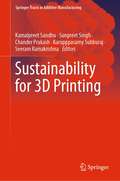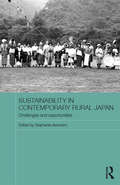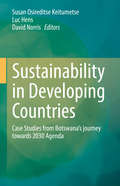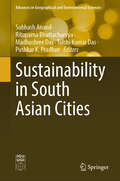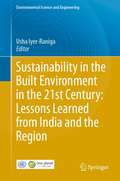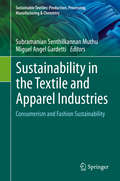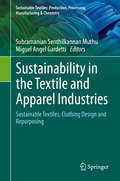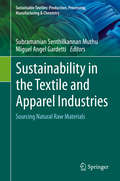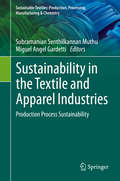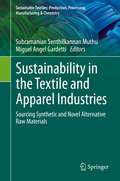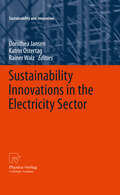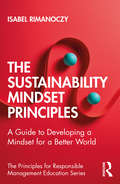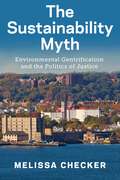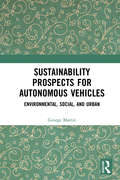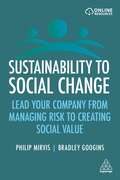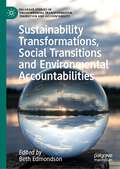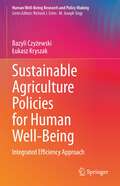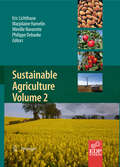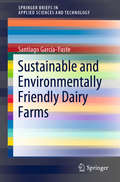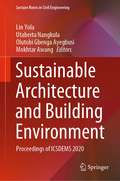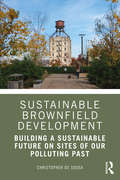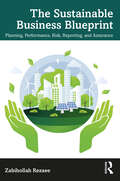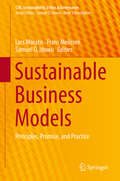- Table View
- List View
Sustainability for 3D Printing (Springer Tracts in Additive Manufacturing)
by Kamalpreet Sandhu Sunpreet Singh Chander Prakash Karupppasamy Subburaj Seeram RamakrishnaWith advancement in modern technology human life span in 21st century has significantly improved as compared to past centuries. Indeed, the manufacturing and household wastes have also boosted in the same era, presenting a hazardous condition to the various living beings. However, through smart methodologies, it can be possible to recycle/reuse of the different types of wastes as a feedstock convenient for specialized manufacturing technologies, such as 3D printing. This means that through proper facilities the waste can be used as the raw material for the printing technologies with characteristic at par with the virgin feedstock. Furthermore, producing the feedstock using waste materials will help to reduce the cost of the processing material, productivity and eco-friendliness of this manufacturing technology. This book will cover a boarder aspect of such efforts wherein various applications and state of art solutions will be discussed in a comprehensive way. This book will be much interest for academics, research and entrepreneur who are working in the field materials science, 3D printing, and manufacturing because of its coverage of state of art solution in the field of commercial, industrial and healthcare products.
Sustainability in Contemporary Rural Japan: Challenges and Opportunities (Routledge Studies in Asia and the Environment)
by Stephanie AssmannRural communities in Japan have suffered from significant depopulation and economic downturn in post-war years. Low birth rates, aging populations, agricultural decline and youth migration to large cities have been compounded by the triple disaster of 11 March 2011, which destroyed farming and fishing communities and left thousands of people homeless. This book identifies these challenges and acknowledges that an era of post-growth has arrived in Japan. Through exploring new forms of regional employment, community empowerment, and reverse migration, the authors address potential opportunities and benefits that may help to create and ensure the quality of life in depopulating areas and post-disaster scenarios. This book will be of interest not only to students of Japanese society, but also to those outside of Japan who are seeking new approaches for tackling depopulation challenges.
Sustainability in Developing Countries: Case Studies from Botswana’s journey towards 2030 Agenda
by Susan Osireditse Keitumetse Luc Hens David NorrisThis book illustrates an alternative approach to ‘state of sustainability’ reporting by presenting cross-sectoral and multi-disciplinary discussions on sustainability issues in the context of a developing country, Botswana. The book volume illustrates how academic publishing can supplement African governments' existing forms of reporting on sustainability by providing on-ground detailed descriptions and experiences relating to achievement of the various sustainable development goals (SDGs). In addition, this process involves, increases and enhances diversity of stakeholders that report on sustainability. Furthermore, the approach resonates with the UN’s recommendation to build local strategies for implementation of the 2030 agenda for sustainable development. Conventional reporting on sustainability by most African countries is an exercise that is customarily the preserve of designated government ministries. While this form of reporting provides a consistent platform for tracking sustainable development goals, it can also benefit from juxtaposition with in-depth descriptions and experiences provided by academic publishing. Academia, through publishing, provides a framework for on-ground situation-analysis as well as in-depth descriptions of African country’s grass-root experiences, thus allowing for temporal tracking of sustainable development milestones. As this volume illustrates, experiences from the various contributors on this volume highlight different points of departure towards achieving the 2030 agenda. Topics covered include biodiversity, water management, world heritage, environment, education, tourism, gender, institutional approaches to achievement of SDGs, as well as contribution of non-governmental organisations (NGO)'s amongst others.
Sustainability in South Asian Cities (Advances in Geographical and Environmental Sciences)
by Subhash Anand Rituparna Bhattacharyya Madhushree Das Tulshi Kumar Das Pushkar K. PradhanThis book explores some of the common socio-economic and environmental challenges faced by the cities of South Asia, which remain highly under-researched. South Asia comprises eight nations—India, Bangladesh, Nepal, Sri Lanka, Bhutan, Maldives, Pakistan, and Afghanistan, consisting of a total population of 1.92 billion in 2022. The majority of the cities in these countries are characterized by haphazard urbanization and multi-dimensional poverty alongside its associated ingredients— floods, water scarcity, food crises, poor sanitation, slums and squatter settlements, and pollution, among others. This comprehensive book is contributed by interdisciplinary scholars and includes 25 case studies. The volume brings these socio-economic and environmental challenges to the fore for a better and more nuanced understanding. The book help policymakers to mitigate the challenges and build sustainable cities.
Sustainability in the Built Environment in the 21st Century: Lessons Learned from India and the Region (Environmental Science and Engineering)
by Usha Iyer-RanigaThis book follows on previous works addressing sustainable development research in the Asia-Pacific region. It mainly focuses on India, a country currently facing immense challenges in the form of climate change, rapid urbanisation, and population pressures in its journey to help achieve the Sustainable Development Goals. Expecting to surpass China in terms of population in the near future, India needs to develop its own solutions in order to uphold its commitments under the Paris Agreement. This book makes a contribution in that direction by presenting case studies on various aspects of the built environment, from education to managing cities, procurement, and considerations for a circular economy. The papers gathered here offer a vital resource for government policymakers, educators, and current and future professionals, equipping them with the knowledge and expertise they need in order to overcome today’s complex challenges in the built environment.
Sustainability in the Global City
by Cindy Isenhour Gary McDonogh Melissa Checker Cindy Isenhour Gary McdonoghCities play a pivotal but paradoxical role in the future of our planet. As world leaders and citizens grapple with the consequences of growth, pollution, climate change, and waste, urban sustainability has become a ubiquitous catchphrase and a beacon of hope. Yet, we know little about how the concept is implemented in daily life - particularly with regard to questions of social justice and equity. This volume provides a unique and vital contribution to ongoing conversations about urban sustainability by looking beyond the promises, propaganda, and policies associated with the concept in order to explore both its mythic meanings and the practical implications in a variety of everyday contexts. The authors present ethnographic studies from cities in eleven countries and six continents. Each chapter highlights the universalized assumptions underlying interpretations of sustainability while elucidating the diverse and contradictory ways in which people understand, incorporate, advocate for, and reject sustainability in the course of their daily lives.
Sustainability in the Textile and Apparel Industries: Consumerism and Fashion Sustainability (Sustainable Textiles: Production, Processing, Manufacturing & Chemistry)
by Subramanian Senthilkannan Muthu Miguel Angel GardettiThis book is part of a five-volume set that explores sustainability in textile industry practices globally. Case studies are provided that cover the theoretical and practical implications of sustainable textile issues, including environmental footprints of textile manufacturing, consumer behavior, eco-design in clothing and apparels, supply chain sustainability, the chemistry of textile manufacturing, waste management and textile economics. The set will be of interest to researchers, engineers, industrialists, R&D managers and students working in textile chemistry, economics, materials science, and sustainable consumption and production. This volume focuses on sustainability aspects of consumerism and fashion, emphasizing the environmental issues that stem from textile care and disposal, and how many of these practices detrimentally impact the environment. Also addressed is the role of consumer knowledge and behavior associated with the clothing industry that may exacerbate these issues, and what can be done to better inform consumers about more sustainable options available to them. The case studies presented cover environmental and social sustainability in the clothing industry, and sustainable development in luxury fashion networks.
Sustainability in the Textile and Apparel Industries: Sustainable Textiles, Clothing Design and Repurposing (Sustainable Textiles: Production, Processing, Manufacturing & Chemistry)
by Subramanian Senthilkannan Muthu Miguel Angel GardettiThis book is part of a five-volume set that explores sustainability in textile industry practices globally. Case studies are provided that cover the theoretical and practical implications of sustainable textile issues, including environmental footprints of textile manufacturing, consumer behavior, eco-design in clothing and apparels, supply chain sustainability, the chemistry of textile manufacturing, waste management and textile economics. The set will be of interest to researchers, engineers, industrialists, R&D managers and students working in textile chemistry, economics, materials science, and sustainable consumption and production. This volume discusses novel trends and concepts in sustainable textile design, including innovative topics such as doodling and upcycling in clothing and apparel design for sustainable fashion initiatives. Along with strategies for repurposing fashion sustainability, the book also covers university interventions for the development of proper and environmentally friendly design practices. Specific technologies addressed include UV applications, laser treatments for dyeing, refined surface design techniques for products such as leather.
Sustainability in the Textile and Apparel Industries: Sourcing Natural Raw Materials (Sustainable Textiles: Production, Processing, Manufacturing & Chemistry)
by Subramanian Senthilkannan Muthu Miguel Angel GardettiThis book is part of a five-volume set that explores sustainability in textile industry practices globally. Case studies are provided that cover the theoretical and practical implications of sustainable textile issues, including environmental footprints of textile manufacturing, consumer behavior, eco-design in clothing and apparels, supply chain sustainability, the chemistry of textile manufacturing, waste management and textile economics. The set will be of interest to researchers, engineers, industrialists, R&D managers and students working in textile chemistry, economics, materials science, and sustainable consumption and production. This volume comprehensively covers the various sustainable natural materials used in textiles that originate from raw materials sourcing. The book discusses agricultural production systems and standards for the development of sustainable textile fibers, the effects of chemical surface modification methods on the properties of textile fibers, and how antibacterial and antifungal textiles can be manufactured using natural resources.
Sustainability in the Textile and Apparel Industries: Production Process Sustainability (Sustainable Textiles: Production, Processing, Manufacturing & Chemistry)
by Subramanian Senthilkannan Muthu Miguel Angel GardettiThis book is part of a five-volume set that explores sustainability in textile industry practices globally. Case studies are provided that cover the theoretical and practical implications of sustainable textile issues, including environmental footprints of textile manufacturing, consumer behavior, eco-design in clothing and apparels, supply chain sustainability, the chemistry of textile manufacturing, waste management and textile economics. The set will be of interest to researchers, engineers, industrialists, R&D managers and students working in textile chemistry, economics, materials science, and sustainable consumption and production.This volume addresses the technologies and mechanical processes of textile production, and what sustainable methods can be employed to achieve improved safety and environmental health. The book covers sustainable aspects of printing, dyeing, coloration, weaving, knitting, tailoring, surface design and antimicrobial finishing for environmentally friendly textile and apparel products.
Sustainability in the Textile and Apparel Industries: Sourcing Synthetic and Novel Alternative Raw Materials (Sustainable Textiles: Production, Processing, Manufacturing & Chemistry)
by Subramanian Senthilkannan Muthu Miguel Angel GardettiThis book is part of a five-volume set that explores sustainability in textile industry practices globally. Case studies are provided that cover the theoretical and practical implications of sustainable textile issues, including environmental footprints of textile manufacturing, consumer behavior, eco-design in clothing and apparels, supply chain sustainability, the chemistry of textile manufacturing, waste management and textile economics. The set will be of interest to researchers, engineers, industrialists, R&D managers and students working in textile chemistry, economics, materials science, and sustainable consumption and production. This volume explores some alternative synthetic raw materials resulting from the recycling and regeneration of renewable textile fibers, and how these sustainable green-based composites can contribute to improved ecological and human health. The book offers insights into the impacts of human-made fibers and microfiber pollution, and how biodegradable material sourcing can help to curb harmful environmental impacts from these practices and achieve clothing and apparel sustainability.
Sustainability Innovations in the Electricity Sector
by Katrin Ostertag Rainer Walz Dorothea JansenThe future of modern societies depends on their ability to deal with the challenge of climate change in the coming decades. One essential component is a better understanding of innovation processes in the energy sector. This book focuses on sustainability innovations in renewable energies, combined heat and power, and energy service contracting, and analyses the institutions, actors and functions within the innovation system. Of particular interest is the question of whether the joint effect of EU-driven market liberalization and climate policies will succeed in establishing market forces that will drive actors towards more climate-friendly energy production. A special focus is on the role of local utilities in the electricity sector as opposed to large transmission net operators or regional net operators. The countries covered in the contributions include Germany, Denmark, the UK, Switzerland, and the Netherlands.
The Sustainability Mindset Principles: A Guide to Developing a Mindset for a Better World (The Principles for Responsible Management Education Series)
by Isabel RimanoczyAs we increase our awareness of the planetary challenges and how they intersect with the discipline or profession we choose to focus on, we have put our attention on the external forces and impacts. What remains untouched however is the set of beliefs, values, assumptions, mental processes, and paradigms that we hold and share: our mindset. But how do we change a mindset? This book is the first to introduce the 12 Principles for a Sustainability Mindset, presenting educators with a framework that makes it easy to include them into teaching plans and lessons of any discipline. Written in a very clear and practical way, the book provides examples, checklists, tips, and tools for professionals and educators. It transforms the development of a much-needed mindset for sustainability into an accessible, fun and intuitive task. The book is written with educators from a variety of disciplines in mind, including but not limited to management educators, coaches, and trainers. No other book comes close to providing such a well-organized and solid way of starting to shift our mindsets in the direction of sustainability.
The Sustainability Myth: Environmental Gentrification and the Politics of Justice (New Directions In Sustainability And Society Ser.)
by Melissa CheckerWINNER OF THE 2021 DELMOS JONES AND JAGNA SHARFF MEMORIAL PRIZE FOR THE CRITICAL STUDY OF NORTH AMERICA!Uncovers the hidden costs and contradictions of sustainable policies in an era driven by real estate developmentFrom state-of-the-art parks to rooftop gardens, efforts to transform New York City’s unsightly industrial waterfronts into green, urban oases have received much public attention. In The Sustainability Myth, Melissa Checker uncovers the hidden costs—and contradictions—of the city’s ambitious sustainability agenda in light of its equally ambitious redevelopment imperatives.Focusing on industrial waterfronts and historically underserved places like Harlem and Staten Island’s North Shore, Checker takes an in-depth look at the dynamics of environmental gentrification, documenting the symbiosis between eco-friendly initiatives and high-end redevelopment and its impact on out-of-the-way, non-gentrifying neighborhoods. At the same time, she highlights the valiant efforts of local environmental justice activists who work across racial, economic, and political divides to challenge sustainability’s false promises and create truly viable communities.The Sustainability Myth is a cautionary, eye-opening tale, taking a hard—but ultimately hopeful—look at environmental justice activism and the politics of sustainability.
Sustainability Prospects for Autonomous Vehicles: Environmental, Social, and Urban
by George T. MartinThe Autonomous Vehicle (AV) has been strongly heralded as the most exciting innovation in automobility for decades. Autonomous Vehicles are no longer an innovation of the future (seen only in science fiction) but are now being road-tested for use. And yet while the technical and economic success and possibilities of the AV have been widely debated, there has been a notable lack of discussion around the social, behavioural, and environmental implications. This book is the first to address these issues and to deeply consider the environmental and social sustainability outlook for the AV and how it will impact on communities. Environmental and social sustainability are goals unlike those of technical development (a new tool) and economic development (a new investment). The goal of sustainability is development of societies that live well and equitably within their ecological limits. Is it reasonable and desirable that only technical and economic success comprise the swelling AV parade, or should we be looking at the wider impacts on personal well-being, wider society, and the environment? The uptake for AVs looks to be lengthy, disjointed, and episodic, in large measure because it faces a range of known unknown risks. This book assesses the environmental and social sustainability potential for AVs based on their prospective energy use and their impacts on climate change, urban landscapes, public health, mobility inequalities, and individual and social well-being. It examines public attitudes about AV use and its risk of fostering a rebound effect that compromises potential sustainability gains. The book concludes with a discussion of critical issues involved in sustainable AV diffusion.
Sustainability to Social Change: Lead Your Company from Managing Risks to Creating Social Value
by Philip Mirvis Bradley GooginsIs your company using its talent to create social value? Or is it simply managing risks? To address the problems facing society and business today, sustainability is not good enough.Instead, companies need to do their part to lead social change. In Sustainability to Social Change, leadership and social innovation experts Philip Mirvis and Bradley K. Googins share their hands-on research to reveal how leaders can design and guide their companies to create more inclusive prosperity and become agents of social change. The book reveals the inside story of how socially innovative companies are making the strategic shift from minimizing risk to creating social value. It then outlines the strategies and practices that leaders can use to address the five biggest problems facing companies and society today: Purpose, Prosperity, Products, Planet and People. Filled with real life examples, hands-on guidelines and self-assessments to rate your company's performance, Sustainability to Social Change helps you pivot your company's mindset and practices in order to enhance society and the environment, and fuel its own success. Online resources include a guide to help employees become socially conscious, operate in a purposeful company, become allies for equity and social justice, add social value at work and establish "green" habits.
Sustainability Transformations, Social Transitions and Environmental Accountabilities (Palgrave Studies in Environmental Transformation, Transition and Accountability)
by Beth EdmondsonThis book draws upon diverse approaches and understandings of sustainability transformations, social transitions and environmental accountabilities. It presents case studies that highlight real-world consequences of changing ideas about how best to achieve effective and durable sustainability transformations and examines how environmental accountabilities and social transitions influence sustainability transformations. Each chapter provides insights regarding how new knowledge and perspectives matter for whether, when, and how people, governments, corporations and international organisations seek and pursue solutions to social-ecological challenges and sustainability dilemmas. It pays sustained attention to whether and how understandings and applications of accountability can improve international sustainability transformations. The chapters presented in this book consider some pressing questions concerning social transitions and environmental accountabilities: how can they contribute to sustainability transformations, how do they influence the scalability of sustainability transformations, and, how can such sustainability transformations become durable?
Sustainable Agriculture Policies for Human Well-Being: Integrated Efficiency Approach (Human Well-Being Research and Policy Making)
by Bazyli Czyżewski Łukasz KryszakThis book deals with the important topic of policies for sustainable agriculture, since food insecurity is a growing concern for policy makers and will affect the quality of life and well-being of generations to come. The authors provide a theoretical background to the concept of sustainable agriculture including its recent developments; monitor the current state of sustainability in agriculture in different regions of the world; and evaluate current agricultural policies to propose new solutions. They show practical ways of sustainability measurement that could be applied to different regions. The book takes into account sustainability indicators based on economic, social and environmental aspects and discusses the trade-offs between these three dimensions. It also answers the question of whether current agricultural policies contribute to balancing between the goals of agriculture---that of not just providing food but of contributing to the greater good---and how policies differ and have evolved across the world. Finally, it puts together the best practices of sustainability for the use of policymakers. The book pays particular attention to least developed countries where hunger and malnutrition are high, but where productivity should not come at the expense of environmental and social goals. This book is of use to a wide readership of policy makers, professionals and academics in the social and environmental sciences interested in the improvement of human life through sustainable agricultural policy implementation.
Sustainable Agriculture Volume 2
by Eric Lichtfouse Marjolaine Hamelin Mireille Navarrete Philippe DebaekeThis book gathers review articles that analyze current agricultural issues and knowledge, then propose alternative solutions. It will therefore help all scientists, decision-makers, professors, farmers and politicians who wish to build a safe agriculture, energy and food system for future generations.
Sustainable and Environmentally Friendly Dairy Farms (SpringerBriefs in Applied Sciences and Technology)
by Santiago García-YusteSustainable and Environmentally Friendly Dairy Farms presents an innovative environmental proposal. While chiefly focusing on dairy farms, the environmental solution it describes is applicable to the entire livestock sector. The book is divided into five chapters, the first of which addresses the carbon footprint of dairy farms. Chapter two provides an overview of the animal production system, focusing on the physiology of the ruminant stomach and the greenhouse gases emitted by dairy cows. In turn, the third chapter covers dairy farm systems, explaining both intensive and extensive husbandry systems. The book’s final two chapters present the-state-of-art in CO2 capture, and describe a new and innovative CO2-RFP strategy. Given its scope, the book will be of interest to chemists, biologists, biotechnologists, and researchers active in agriculture and food-related areas, as well as those working in the food and dairy industry.
Sustainable Architecture and Building Environment: Proceedings of ICSDEMS 2020 (Lecture Notes in Civil Engineering #161)
by Lin Yola Utaberta Nangkula Olutobi Gbenga Ayegbusi Mokhtar AwangThis book presents articles from the International Conference on Sustainable Design, Engineering, Management, and Sciences (ICSDEMS 2020), held in Bali, Indonesia. It highlights recent advances in civil engineering and sustainability, bringing together researchers and professionals to address the latest, most relevant issues in these areas.
Sustainable Brownfield Development: Building a Sustainable Future on Sites of our Polluting Past
by Christopher De SousaWhile industrial and chemical innovations have contributed extensively to human advancement, the darker part of their legacy has been the hundreds of thousands of polluted sites left behind. Governments at all levels have rallied to support the remediation and reuse of these land resources and put many of the nation’s brownfields back into productive use. This book presents two dozen brownfield projects in the United States that have incorporated sustainability, highlighting project features, best management practices, and lessons from the field regarding the underlying policies and practices that enabled these projects to be completed or, in some cases, stalled, altered or abandoned. The case studies represent an array of brownfield projects that aimed to go beyond conventional practice and include a range and variety of end uses (e.g., corner gas stations, industrial, office, residential, brightfields, green space, mixed-use and transit-oriented developments). The cases investigate site histories, planning and development and examine sustainability characteristics to understand how projects overcame the barriers to brownfield reuse and the implementation of sustainability features and derive a series of lessons learned, including innovative policies, programs, and/or funding mechanisms that helped make these projects work. Sustainable Brownfield Development will be of interest to developers, planners, consultants and community representatives interested in environmental policy, urban planning, community development, ecological restoration, economic development, and parks planning by providing direction and inspiration for those eager to erase the blight of the past and build a more sustainable future.
The Sustainable Business Blueprint: Planning, Performance, Risk, Reporting, and Assurance
by Zabihollah RezaeeUnderstanding how to build and manage a sustainability business plan has become a business imperative as investors demand, regulators require, and stakeholders increasingly expect companies to report their financial economic sustainability performance (ESP) and non-financial environmental, social, and governance (ESG) sustainability information. This book provides both the rationale for and key practical steps in how to approach business sustainability factors of planning, performance, risk, reporting, and assurance.This comprehensive book covers all the areas that a business would need to embed, articulate, and execute a strategy of profit-with-purpose in promoting shared value creation for all stakeholders. It addresses drivers, sources, and international guidelines (GRI, IIRC, SASB, FASB, PCAOB, IAASB, ISSB) for prioritising business sustainability factors, and establishing the link between ESG performance and financial performance. It presents key performance indicators (KPIs) of ESP and ESG dimensions of sustainability performance. It also provides templates for performance, risk, and disclosure; presenting cases and examples of why to disclose ESG performance, what to disclose, and where and how to disclose ESG performance information.For businesses wanting a detailed understanding of how to deliver on these important areas, including boards of directors, senior management, financial officers, internal auditors, external auditors, legal counsel, investors, and regulators, this book is an invaluable resource.
Sustainable Business in the Era of Digital Transformation: Strategic and Entrepreneurial Perspectives (ISSN)
by Vesna Zabkar Marek Ćwiklicki Mariusz Sołtysik Magdalena Wojnarowska Maria Urbaniec Erica VareseSustainable development is a complex issue and despite many studies and publications in recent years, it remains poorly recognised on best practices in core business areas. Achieving the Sustainable Development Goals in accordance with the 2030 Agenda for Sustainable Development depends on research and innovation. Therefore, the transition to sustainable development requires investment in technology, new business models, and social and environmental innovations that contribute to shaping new business and promoting sustainable business practices.This book seeks to understand how sustainability affects core business areas, with a focus on strategic and entrepreneurial activities. Given these considerations, the main purpose of this book is twofold: (1) to contribute to a better understanding of important and current trends in the field of sustainable transformation in core business areas; and (2) to provide a comprehensive overview of quantitative and qualitative studies in the field. The book ultimately seeks to shed light on how companies are implementing sustainable transformation in the core areas of product and marketing, entrepreneurship, and innovation, which is supported by appropriate project management strategies.The book provides researchers and upper-level students in economics, business, and other social sciences with an overview of interdisciplinary theoretical and conceptual perspectives and frameworks for successful business transformation. It will be of particular value to those researching sustainable development and strategic management.
Sustainable Business Models: Principles, Promise, and Practice (CSR, Sustainability, Ethics & Governance)
by Samuel O. Idowu Frans Melissen Lars MoratisThis book provides a rich overview and takes a closer look at the current state of theory and practice in the field of sustainable business models. The chapters in this book examine and analyze existing and new approaches towards sustainable business models and showcase the implementation of sustainable business through both quantitative and qualitative studies, including several case studies and many practical examples. It approaches these issues from the standpoints of diverse business disciplines to yield new insights and ideas that are relevant from both an academic and professional perspective. In its essence, the book examines how firms’ value creation processes can be driven by sustainability and social responsibility and how this impacts business and society. Readers will find a range of sustainable business models that have been employed and are being pioneered in various industries around the globe – which are thoroughly investigated and discussed, and put into a comprehensive conceptual framework.
